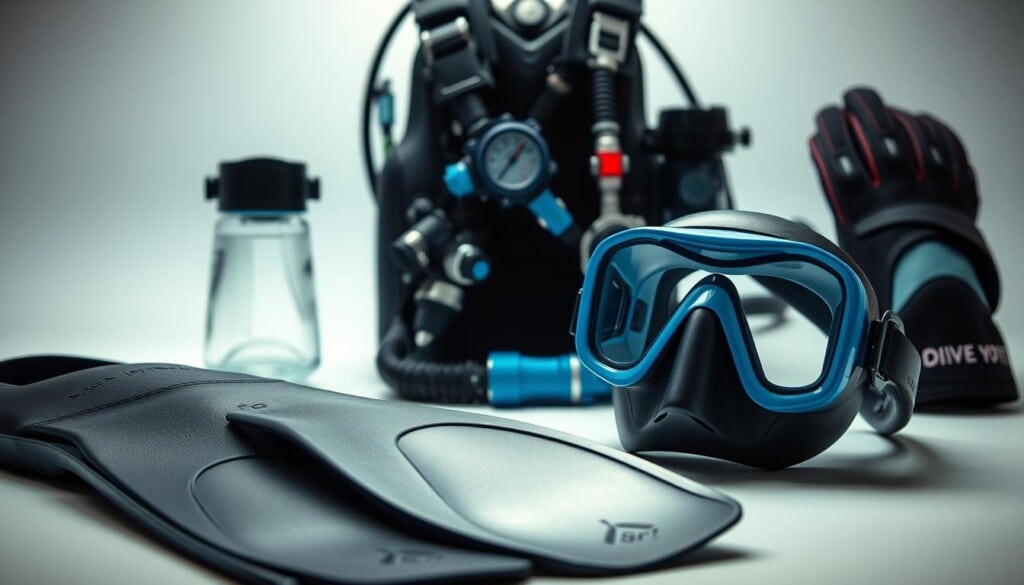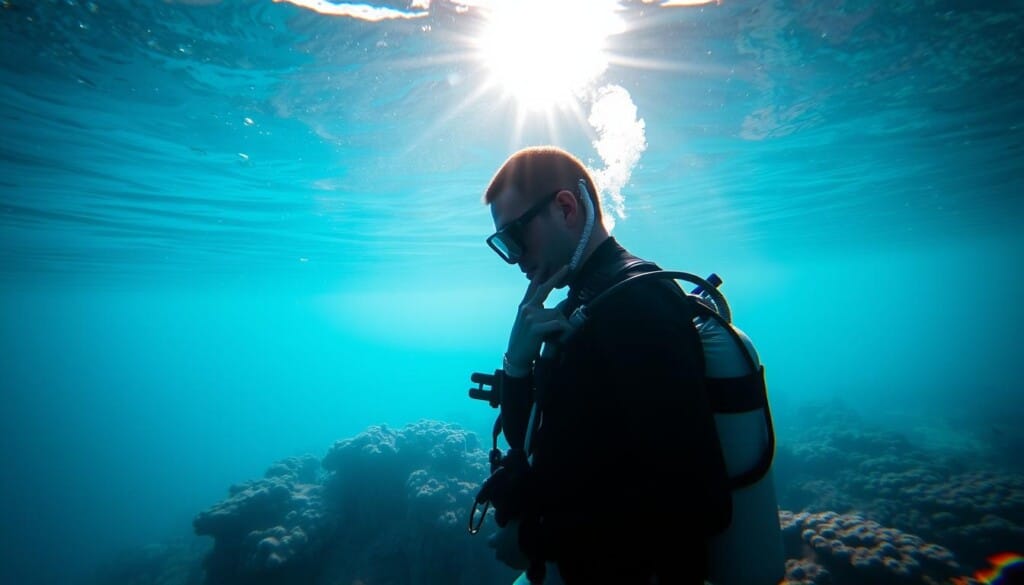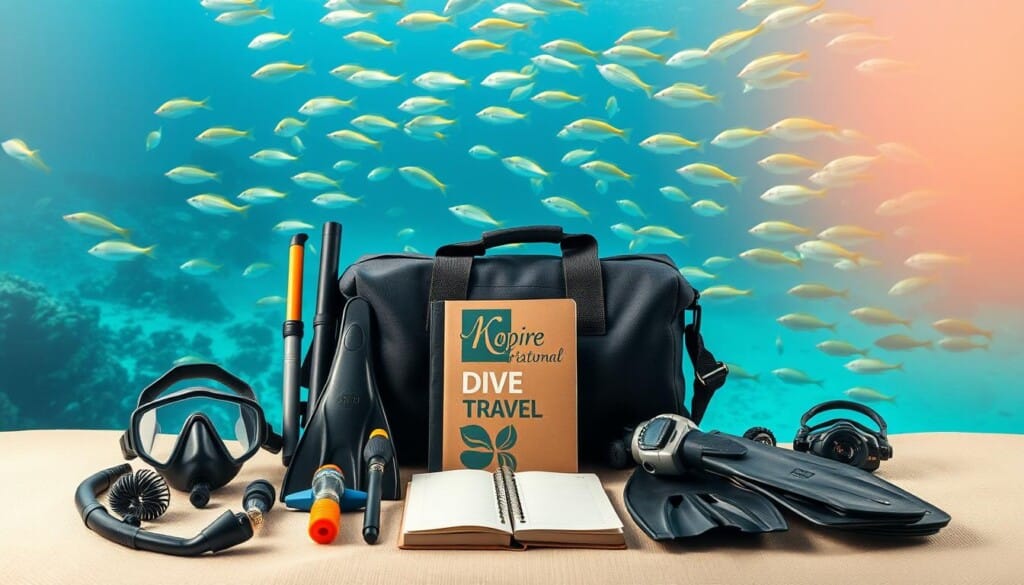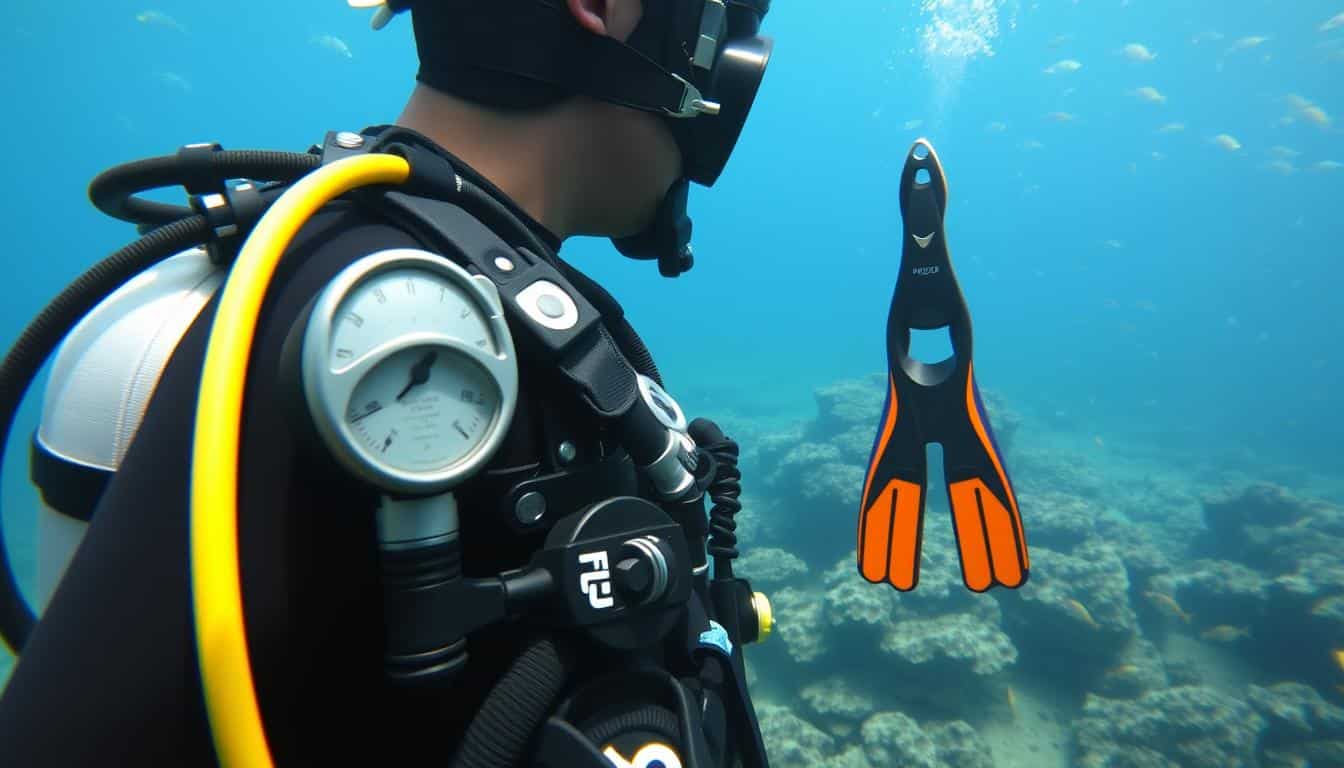What if the keys to unlocking our planet’s most mesmerizing secrets lie beneath the surface of the water? This question invites both novice and seasoned divers to explore the captivating world of diving. In this guide, we’ll cover the basics of scuba diving, from the gear you need to the best dive sites in the United States.
Whether you’re starting your first dive or looking to improve your skills, knowing the basics is key. Join us as we guide you through the underwater world. We’ll teach you how to dive safely and responsibly.
Key Takeaways
- Diving is an exhilarating way to explore underwater ecosystems.
- Essential diving gear includes wetsuits, masks, and regulators.
- Popular dive sites, like the Florida Keys, offer diverse marine life.
- Safety practices and emergency protocols are vital for every diver.
- Engaging with local diving businesses enhances the diving experience.
- Environmental responsibility is critical in underwater exploration.
Understanding the Basics of Diving
Diving is about going into the water for fun or work. It lets people see the beauty of underwater worlds. Scuba diving is a favorite, where people use special gear to see more of the sea.
As they dive, they learn about the sea’s life and its secrets. This makes them appreciate the sea’s complex world.
There are many ways to dive, each with its own thrill. You can snorkel for fun or try cave diving for adventure. Commercial diving is for those who dive for work. There’s something for everyone, no matter their skill level.
Diving Gear: Must-Have Essentials
Choosing the right diving gear is key for safety and fun. The right scuba diving equipment keeps you comfortable and safe underwater. Each piece is important for a safe dive.
Wetsuits and Dry Suits
Wetsuits and dry suits keep you warm while diving. Wetsuits trap water that warms up to your body’s temperature. Dry suits keep you dry and are best for cold water.
Choosing the right suit depends on the water temperature and your dive. It’s all about comfort and safety.
Masks, Fins, and Snorkels
A good mask, fins, and snorkel are basic for diving. A well-fitting mask lets you see underwater. Fins help you swim better. Snorkels let you breathe at the surface without lifting your head.
High-quality gear makes diving more enjoyable and effective.
Tanks and Regulators
Dive tanks and regulators are vital for breathing underwater. Tanks hold compressed air for safe exploration. Regulators control the air flow for a steady supply.

Popular Diving Destinations in the U.S.
The United States has many famous scuba diving spots for all levels. Each place has its own underwater world, full of life and beauty. Exploring these sites improves your skills and lets you see the ocean’s wonders. Here are some top places to dive next.
The Great Barrier Reef
The Great Barrier Reef is famous, but it also reaches U.S. areas. It’s full of life, with thousands of marine species. You can see colorful coral, shipwrecks, and lots of fish, making it perfect for diving.
Florida Keys
The Florida Keys are a top spot for diving, with their beautiful coral reefs and clear waters. The islands have many dive sites for all skill levels. You can dive in Key Largo’s vibrant coral or around the Dry Tortugas for amazing experiences.
Monterey Bay
Monterey Bay is a key part of the Pacific Coast’s diving scene. It’s home to rich marine environments and diverse wildlife. You can see seals, sea otters, and colorful fish here. With its kelp forests and underwater canyons, it’s a place you must dive.
Safety First: Diving Practices to Follow
Keeping safe while diving means following set rules. A pre-diving checklist is key to get ready for the dive. It helps avoid risks and makes sure everyone knows the safety steps.
This checklist makes sure all gear works right. It’s a big step in keeping the dive safe.
Pre-Diving Checklist
A good pre-diving checklist covers all the basics. Check that your dive gear, like tanks and regulators, is in good shape. Make sure your wetsuit fits right and your accessories are ready.
Also, talk over the dive plan with your team. Discuss where you’ll go in and out, and how deep you’ll dive. Make sure everyone knows their part in the dive.
Emergency Protocols
Knowing what to do in an emergency is important. Learn the signs of trouble that can happen to others. Use hand signals or special underwater devices to talk.
If something goes wrong, know where to go and how to get there fast. Doing drills often helps everyone remember these steps. It makes diving safer for everyone.

Local Diving Schools and Certifications
Diving schools are key in teaching divers through training and certification. They help people at all skill levels learn and grow. PADI (Professional Association of Diving Instructors) is a top name in diving education. They offer structured training that leads to recognized diving certifications.
This certification is vital for diving worldwide. It shows divers have the knowledge and skills needed.
Finding the Right Course
Choosing the right diving course is essential for new divers. Courses range from beginner programs like Discover Scuba Diving to advanced ones like Deep, Wreck, and Night Diving. It’s important to think about what you want to learn and your experience level.
Exploring local diving schools and their programs helps make the right choice. This ensures your diving goals are met.
Importance of Certification
Getting a diving certification is key for safety and skill. It proves divers have the right training and know the risks. Many dive operators need to see certification before letting you dive with them.
This rule shows how important good training is. It keeps divers safe and competent.
Diving for Beginners: Tips and Tricks
Starting your first scuba diving adventure? Knowing the basics is key. It’s not just about putting on a tank and jumping in. Getting ready right can make your dive safer and more fun.
First Dive Guidelines
Your first dive is an exciting start to the underwater world. Learn about your gear, how to control your buoyancy, and dive with a buddy. Clear communication is important; use hand signals to talk underwater. Knowing the basics helps you stay safe and feel more confident.
What to Expect
Before your first dive, you might feel both excited and a bit scared. Remember, the water can be clear or murky, and you might face surprises. Stay calm and focus on your breathing to reduce stress. Enjoy the sights, whether it’s colorful coral or interesting sea creatures. It’s all part of a great diving experience.
Environmental Responsibility in Diving
Diving requires us to protect the ocean’s delicate balance. It’s important for divers to learn about marine conservation. This helps them reduce their impact on the underwater world.
Understanding the value of biodiversity is key. It also means supporting efforts to keep ocean habitats healthy.
Understanding Marine Conservation
Marine conservation is about managing ocean resources wisely. It aims to save endangered species and protect coral reefs. Divers must follow rules to avoid harming these ecosystems.
Knowing about the unique creatures in the ocean helps us appreciate them more. It also encourages us to keep working on conservation.
Practices for Sustainable Diving
Sustainable diving is good for both the diver and the ocean. Keeping a safe distance from marine life and not touching coral helps protect the sea. Learning about environmental responsibility makes diving better and encourages others to dive responsibly.
Passionate divers can inspire others. By sharing their love for marine conservation and sustainable diving, they can make a big difference.
Dive Travel: Planning Your Next Adventure
Planning dive travel is key to a memorable underwater adventure. It involves packing the right gear and choosing trusted dive operators. Following these steps can make your ocean journey even better.
Packing for a Diving Trip
Packing right is essential for diving trips. Make sure to pack must-haves like wetsuits, regulators, and dive computers. A detailed packing list helps keep your gear in order and prevents forgetting anything.
Don’t forget extras like sunscreen, a first-aid kit, and a waterproof bag. These items make your dives smoother and safer.
Choosing the Right Dive Operator
Finding a reliable dive operator is critical. Look for operators with good reviews and safety records. Working with experienced operators means you get expert guides, top-notch equipment, and safe diving practices.
This choice greatly affects your diving experience. So, it’s important to pick wisely.

Local Insights: Find Diving Businesses with LocalZ
Finding the right diving businesses is key for underwater exploration. LocalZ is a great tool for finding local dive shops. It has a directory that lets users find shops that fit their needs.
How to Use LocalZ for Locating Dive Shops
Using LocalZ is easy. Just enter your location or diving area to find nearby shops. Each shop’s page has contact info, services, and reviews. This helps divers choose the best local businesses for their needs.
Benefits of Engaging Local Businesses
Supporting local dive shops through LocalZ has many benefits. It helps the local economy and builds relationships with diving experts. Plus, local shops know the best dive spots, making your experience better. Using LocalZ connects you with these opportunities for safer, more fun dives.
Community-driven Diving Initiatives
Community-driven initiatives make divers and water lovers feel connected. They help protect marine life and make diving better for everyone. By supporting local charities, people can help their oceans and learn about environmental issues.
Supporting Local Dive Charities
Local charities work hard to save our oceans and keep them healthy. By donating or helping out, you join a big effort to protect marine life. This shows you care about the planet and helps fund important projects.
Volunteering Opportunities
Volunteering is a great way for divers to help their communities. Many charities have programs like beach clean-ups and fixing reefs. It’s a chance to make a difference and meet others who care about the ocean.
Join the Diving Community with LocalZ
Being part of the dive community can really make diving better. LocalZ connects divers with local experts. They share insights, resources, and experiences that are hard to find elsewhere.
By joining LocalZ, you can share your knowledge and explore new places. You’ll meet others who love diving as much as you do. It’s a great way to learn and have fun underwater.
Connecting with Local Divers
LocalZ lets you meet divers who know the local waters well. They share tips and advice to improve your diving skills. It’s a place where everyone feels welcome, whether you’re new or experienced.
Being part of LocalZ means you’re diving responsibly. You’ll learn how to protect the ocean while diving. It’s a chance to dive with others and get tips from the best.

